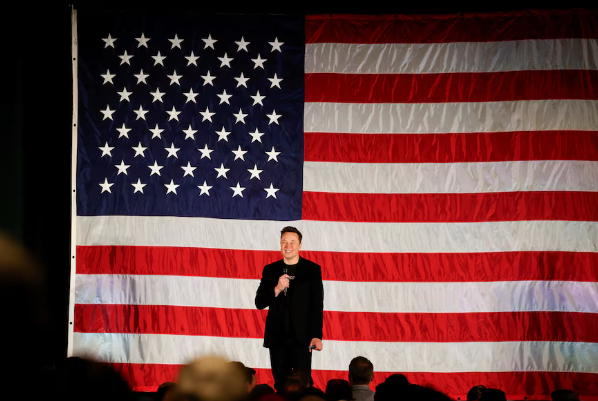Elon Musk offers a $1 million giveaway to voters who sign his free-speech and gun-rights petition, entering a gray area of election law. Legal experts disagree on whether the billionaire supporter of Donald Trump violates prohibitions against paying people to register to vote.
Musk, CEO of Tesla (TSLA.O), promises to award $1 million each day to a randomly selected person who signs his online petition in support of the First and Second Amendments of the U.S. Constitution, which protect free speech and gun ownership.
“There is certainly an argument that this falls within the scope of a federal prohibition on paying a person to vote or register to vote,” says Daniel Weiner from the Brennan Center for Justice. “This reflects a pattern of him skating up to the edge of election laws that we’ve seen in recent weeks.”
Musk’s representatives did not respond to requests for comment on Monday.
Four legal experts debate whether the giveaway violates federal laws that criminalize paying or offering payment for voter registration. Brad Smith, a professor at Capital University Law School and former Federal Election Commission chairman, believes Musk likely remains in the clear because signing the petition is distinct from registering to vote. “The mere fact that there might be an incentive doesn’t equate to payment for a particular activity,” Smith asserts.
Musk’s actions could influence the closely contested presidential race between Trump and Democratic opponent Vice President Kamala Harris. Musk’s America PAC aims to mobilize and register voters in key battleground states likely to decide the election. The petition requires signers to be registered voters in Arizona, Georgia, Michigan, Nevada, North Carolina, Pennsylvania, or Wisconsin—all critical states.
Pennsylvania’s Democratic governor, Josh Shapiro, expressed concern over the giveaway on Sunday and called for a law enforcement investigation. While Musk’s promotion does not directly encourage voter registration, Richard Hasen, a law professor at UCLA, argues that the timing and focus on battleground states suggest the petition serves merely as a pretext, rendering the sweepstakes illegal. “I think signing the petition is irrelevant to the legal question because you must be a registered voter. It doesn’t matter if you add other conditions,” Hasen explains, noting that the U.S. Department of Justice election crimes manual specifically mentions lottery chances as potentially illegal payments.
Adav Noti of the nonpartisan Campaign Legal Center concurs, stating it is illegal to distribute money conditioned on voter registration. Weiner from the Brennan Center describes the promotion as legally “fishy” but still ambiguous. He emphasizes that the core issue revolves around whether the petition serves as a mere cover for soliciting voter registration.
Conversely, Smith argues that Musk may have other legitimate reasons for seeking petition signatures, including compiling names of potential voters who support his causes. Forbes ranks Musk as the world’s richest person, and he has contributed at least $75 million to America PAC, according to federal disclosures, making the group vital to Trump’s campaign to reclaim the White House. Musk has increasingly backed Republican causes and has become a vocal Trump supporter this year. Trump has mentioned that if elected, he would appoint Musk to lead a government efficiency commission. When reporters inquired about Musk’s giveaway on Sunday, Trump replied, “I haven’t followed that.”

